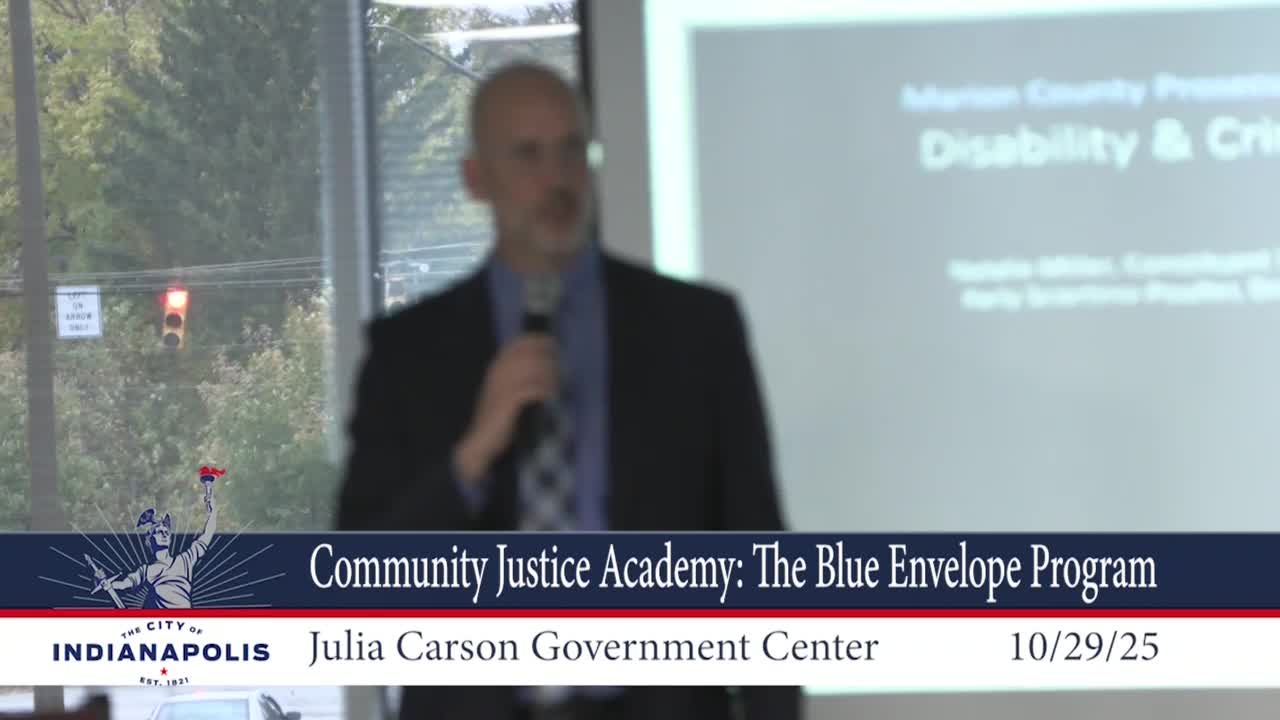Marion County prosecutors, Arc of Indiana outline "Blue Envelope" to ease police stops for drivers with disabilities
Get AI-powered insights, summaries, and transcripts
Subscribe
Summary
The Marion County Prosecutor's Office and Arc of Indiana described the Blue Envelope, a visor-mounted folder with information and directions intended to make traffic stops safer and clearer for drivers with disabilities.
Indianapolis — The Marion County Prosecutor's Office on Wednesday presented the Blue Envelope program to attendees of the Community Justice Academy, describing a visor-mounted folder designed to improve communication and safety during traffic stops involving drivers with disabilities.
Prosecutor Ryan Meares opened the session by noting the program responds to concerns from families and advocates that sensory or communication differences can be mistaken for uncooperative or intoxicated behavior during police stops. "We have to make sure law enforcement and the criminal justice system does a good job of establishing and building trust with people in our community," Meares said (00:01:27).
Natalie Miller, constituent service coordinator and cofounder/director of the Different Not Less initiative at the Marion County Prosecutor's Office, said the Blue Envelope clips to a vehicle visor and contains essentials such as registration and a short note for officers that explains the driver's disability and how the driver may react under stress. "It not only provides a place to keep essential documents... but also has language on it communicating directly to the officer: 'This person has a disability and may not react to x, y, and z the way you might expect,'" Miller said (00:43:22).
Miller and Carly Shortino Coulter, director of the Arc Advocacy Network/Arc of Indiana, framed the program as part of a broader effort to increase disability awareness among prosecutors, police and dispatchers. Miller described two principal goals of the office's Different Not Less initiative: creating internship and employment opportunities for people with disabilities and increasing disability awareness in Marion County.
Presenters reviewed data to explain the program's rationale. Miller cited U.S. Census figures about disability prevalence and national studies that show people with disabilities face higher victimization rates and that many incarcerated people have psychiatric or nonpsychiatric disabilities. She also cited Section 14(c) of the Fair Labor Standards Act when discussing subminimum wages and noted 16 states have banned the practice; she said Indiana is not among them (00:14:39).
Miller said the Blue Envelope launched in April 2025. As of the most recent Monday, she reported 470 envelopes had been mailed in response to requests; 270 requests originated in Indianapolis, and requests came from roughly 85 cities or towns across Indiana. Miller said at least 46 counties were represented and that two envelopes were mailed out of state (Arizona and Florida). She also said the program saw a large spike in requests after social-media posts, a television interview with Meares and a statewide webinar (00:44:52).
The presenters emphasized the program is not a substitute for training. Miller and Shortino Coulter urged training for 9-1-1 dispatchers and officers so dispatchers can flag calls appropriately and officers know how to adjust their interactions. "By having that blue envelope, that's putting that officer on notice, 'Oh, hey, wait. This may not be what you think it is,'" Shortino Coulter said, describing how visual cues can prevent misinterpretation of mobility- or speech-related differences (00:49:47).
Panelists named local resources they said officers should know about, including Marion County's mobile crisis assessment team (a response team pairing an officer, an Eskenazi clinician and an EMT) and the behavioral health unit, which connects frequent 9-1-1 users with services. Miller said the envelope includes instructions for drivers (for example, "wait until you have explicit permission to leave") and a place for emergency contacts and disability notes to open a communication channel during stops.
When asked how success will be measured, panelists cited both quantitative and qualitative indicators: volume of requests and geographic spread; the number of other jurisdictions seeking to adopt similar programs; and testimony from families that envelopes increased a sense of safety and independence. "Finding a more measurable way to determine this is something I would like to do," Shortino Coulter said, noting quantifiable metrics would help if advocates pursue statewide adoption (01:03:12).
Panelists also addressed an Indiana legislative development mentioned during questions: lawmakers recently favored a separate "yellow-dot" decal for window display that notifies first responders of possible medical issues in a vehicle. Panelists described that as a different legislative path taken at the state level and said it does not replace the Blue Envelope's intent to improve police-driver communications.
The event closed with logistics for attendees: a sign-up sheet for envelopes was available in the back of the room, staff asked attendees to record city and county for distribution tracking, and outreach staff prepared to distribute certificates and t-shirts.
No formal policy or ordinance was passed at the session; the meeting was an informational presentation and community outreach event. The presenters encouraged continued outreach to other law-enforcement agencies, training for dispatchers and officers, and wider distribution and evaluation of the Blue Envelope program.
